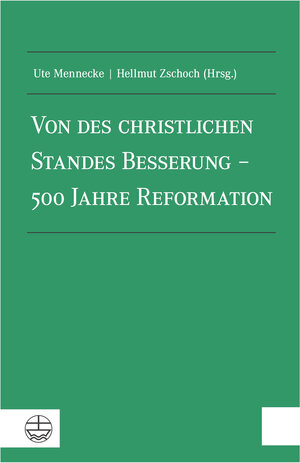
×
![Buchcover ISBN 9783374052325]()
Von des christlichen Standes Besserung – 500 Jahre Reformation
herausgegeben von Ute Mennecke und Hellmut ZschochReformation bedeutet Veränderung. Sich an den Beginn der Reformation vor 500 Jahren zu erinnern, bedeutet, sich auf Prozesse der Veränderung einzulassen, auf Spuren aus der Vergangenheit, die bis in die Gegenwart und über sie hinaus erreichen. Theologie, die sich auf die evangelischen Ursprünge des Christentums besinnt, bewirkt Veränderungen, eine Reform der Christenheit. Programmatisch lautet der Titel von Luthers Reformaufruf von 1520: »An den christlichen Adel deutscher Nation von des christlichen Standes Besserung«. Die damit angestoßenen Veränderungsprozesse brachten Religion und Reform in eine Beziehung, die über die Kontexte des 16. Jahrhunderts bis in die kirchliche und gesellschaftliche Gegenwart hinausführt und dabei auch kirchliche Binnenperspektiven, die Grenzen konfessioneller Institutionen und sogar die der christlichen Religion sprengt.
Auf dem Bogen der reformatorischen Impulse setzen die Beiträge des Bandes Akzente aus unterschiedlichen Perspektiven, von der Kirchengeschichte bis zur Religionswissenschaft, von biblischer Exegese zur Praktischen Theologie und Wirtschaftswissenschaft, von Luther bis zu den Freikirchen.
Die Beiträge entstammen einer Ringvorlesung, die als akademischer Beitrag zum Reformationsjubiläum im Rheinland gemeinsam von der Evangelisch-Theologischen Fakultät der Universität Bonn und der Kirchlichen Hochschule Wuppertal/Bethel durchgeführt wurde.
[Concerning the Reform of the Christian Estate] Reformation means change. To remember the beginning of the Reformation 500 years ago means to engage in processes of change, to take up traces of the past which reach into the present and beyond. A theology which reflects the Evangelical origins of Christianity induces changes, a reform of Christianity. Luther’s call to reform from 1520 has the programmatic title: »Open Letter to the Christian Nobility of the German Nation. Concerning the Reform of the Christian Estate«. The reform processes associated religion with reform which leads beyond the context of 16th century up to the present, breaking up internal ecclesial perspectives, the boundaries of confessional institutions and even of Christian religion itself.
The contributions of this volume derive from a joint lecture series of the Faculty of Protestant Theology of the University of Bonn and the Ecclesiastical University Wuppertal/Bethel.
[Concerning the Reform of the Christian Estate] Reformation means change. To remember the beginning of the Reformation 500 years ago means to engage in processes of change, to take up traces of the past which reach into the present and beyond. A theology which reflects the Evangelical origins of Christianity induces changes, a reform of Christianity. Luther’s call to reform from 1520 has the programmatic title: »Open Letter to the Christian Nobility of the German Nation. Concerning the Reform of the Christian Estate«. The reform processes associated religion with reform which leads beyond the context of 16th century up to the present, breaking up internal ecclesial perspectives, the boundaries of confessional institutions and even of Christian religion itself.
The contributions of this volume derive from a joint lecture series of the Faculty of Protestant Theology of the University of Bonn and the Ecclesiastical University Wuppertal/Bethel.






